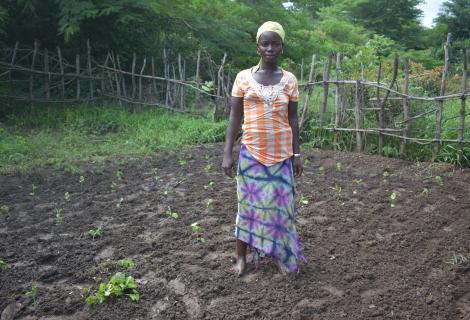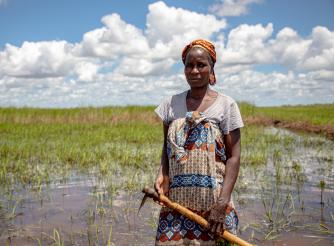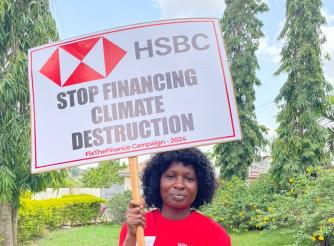Surviving climate change – Fatou’s story

Fatou Keita, 32, is a farmer and manages her household in Bakho, commune of Dimboli, Department of Kedougou, Senegal. She lives with her family, including three daughters.
Fatou is active in her community. She is a member of the local Circle of Reflection and Action, set up by ActionAid and its local partner KEOH. She is involved in all activities carried out by ActionAid locally because this circle is the framework of all decision-making and accountability in the activities conducted locally by ActionAid.
The community in Bakho is already feeling the effects of climate change. Fatou says this is leading to problems with food self-sufficiency, land degraded by water erosion, traditional gold washing and learning to become resilient to climate change.
When asked to describe what climate change means to her, Fatou says: “For me, climate change is the acknowledgement of the total upheaval in the dry rainy seasons, the variation of the temperatures and the numerous storm stops, and the fall of the harvests.”
Because the climate has changed, Fatou’s community can no longer rebuild their local seed capital because the seeds are starting to disappear. The cultivation of millet and rice requires a lot of water, but there’s not as much water as before. Yet these two grains are a very part of the local diet. Arable lands are diminished and disappear because of traditional mining, while harvests are greatly reduced.
In the dry season, access to drinking water becomes burdensome, requiring a four kilometre round trip on a very rough road. In May, the driest time of year, things become very tough for the community. Fatou says: “We are faced with almost, I would say, famine because our crops are exhausted, the water becomes very rare and often polluted - three daily meals are no longer guaranteed.”
When the rainy season sets in two or three months later, the floods destroy most of the plantations because the farmland is at the river's edge, and the river often floods after heavy rains.
Fatou describes how she and her community are adapting to change. She says: “We are protecting our village by using stony cords and adopting other cultural techniques with the support of the local partner KEOH. We often discuss these themes in our Circle meetings.”
If things improve, Fatou’s community will bring change: the stability and the balance of food, the return of access to local seeds and food habits, the restoration and the fertility of cultivable soils.
“ActionAid supports us a lot in our behavioural changes, knowledge of our rights, advocacy and campaigning. We also hope they will continue to support us as there are many challenges,” she says.
Despite the dire situation, Fatou says that her government is not providing any support. She says that it is only ActionAid that is helping in her village, teaching resilience techniques and helping them to learn to use meteorological information.
Fatou’s message to world leaders at the UN Climate Action Summit. She says: “The developed countries are responsible of the pollution of the atmosphere. It is time for action, the fight against climate change will be successful only when we change our behaviour in the face of the environment. We are just suffering so climate justice does not exist for me.”


